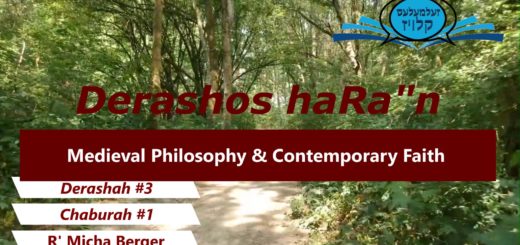Recognizing Your Friend in the Dark
Rav Hutner, in the Pachad Yitzchaq for Purim, addresses the famous medrash (on Mishlei 9) which says that after moshiach comes, all the holidays will cease except Purim. This is derived from the verse (Esther 9:28) “the memory of Purim will never cease from among their descendants.”
The notion that all the holidays in the Torah are not permanent is halachically and hashkafically problematic, so I am reluctant to take this literally. But in either case the primary point is to identify the lesson the medrash is teaching.
Rav Hutner gives a metaphor of two students who were given the job of recognizing their friend in the dark. One is given a flashlight. His job is easy and immediate — shine the light on them and see. The other is given no tools. He learns to listen to voices, to recognize footsteps. At the end of the experiment, though, who learned more? When dawn comes, the first student is exactly where he was the day before. However, the second student now know more about his friend.
Pesach is the flashlight. It’s easy to see G-d’s role in the explicit miracles of leaving Egypt. But in the light of the messianic era, what does Pesach add? Purim teaches us to see Hashem even in the mundane. Purim adds to our relationship with the Creator in a manner that dissimilar and goes beyond.
To add my 2 cents (gild the lily?)…
The difference between the miraculous and the mundane is one of perspective. I’ve written about this before, based on the Maharal’s introduction to Gevuros Hashem, and Rav Dessler’s further development of the notion. In short, most of what we call reality primarily reflects the patterns we place on what’s out there. As the medrash says about the plague of blood, something can be both blood and water, depending on the observer. (See “Rav Dessler on Perception and Reality” for details; actually a good percentage of this blog is related.)
I approached the same idea from a different direction when discussing the miracles of R’ Chanina ben Dosa (Mesukim miDevash, Bo):
[T]here is a famous story of Rav Chanina ben Dosa, a miracle-working tanna who was so poor that he lived off a [qav of] carob from Shabbos to Shabbos. [Carob grew untended, and was available for free.] One week his daughter filled the Shabbos lights with vinegar rather than oil. She was distressed by this mistake, perhaps because of their inability to afford wasted oil or vinegar. Rav Chanina answered her, “He Who made oil burn can make vinegar burn.” And the vinegar burned. Rav Chanina witnessed miracles because they would not violate his free will. He saw the supernatural burning of vinegar no more proof of G-d’s existence than he saw everyday within nature. (Taanis 25a)
The next week I followed up with:
Last week, we explored the story of Rav Chanina ben Dosa’s daughter who accidentally poured vinegar into the Shabbos lamp instead of oil. R’ Chanina ben Dosa told her to light the vinegar. “He who commanded oil to burn could command vinegar to burn.” Last week we explained his statement in erms of free will; the vinegar burning would not prejudice R’ Chanina toward greater faith in Hashem any more than oil burning would.
The Maharal gives us another explanation. Most of us live within a world in which the laws we call “teva” apply. R’ Chanina ben Dosa, however, lived in a world where the laws of neis applied. In this world, oil and vinegar are equally flammable.
Purim is not simply about the possibility of miracles; it’s about being in a world where the natural is as visibly the “Hand” of G-d as the miraculous. To enter a world where oil and vinegar are equally flammable.
That is recognizing His Voice and Step in the darkness.
R’ Hutner concludes:
We see that there exist two types of light. The first is, ” G-d is my light,” and the second is, “Though I sit in darkness, G-d is my light” (Micah 7:8) The special quality of Purim is its ability to bring to the fore the light which breaks through the darkness. Just as that unique light which guides man through darkness has a unique advantage, even surpassing the normal light of the sun, so, too, the pearls of knowledge which shine through the “not knowing” of the ad delo yada of Purim, are especially precious.



No Responses
[…] Recognizing Your Friend in the Dark […]